
"The answer itself doesn't matter. What matters is that you made a choice."
33 posts
Reverie-obsessingtime - Alert: Incoming Brainrot - Tumblr Blog
What do you think about Sunday and Aventurine? and their interaction in 2.1, I know Sunday did what he had to do but I just have a strong dislike for him ever since. He is an interesting character though.
I mentioned on a previous ask that I wanted to talk about narrative foils/character parallels, and that ask mentioned Aventurine being similar to Robin and a little to Sunday. But I thought I'd combine that character foils idea with this post about Sunday because...
Aventurine and Sunday are Near Perfect Character Parallels

(Also sorry to Youtuber Fayato who I screencapped this image from; I literally couldn't find a single other good image of Aventurine and Sunday in the same frame!)
In media, the concept of the narrative foil refers to a character who contrasts another character; by setting the two characters and their plots side by side, the audience is better able to understand the traits of the central character.
And by setting two surprisingly similar characters in opposition to each other, it becomes very clear how even those facing similar circumstances can take diametrically opposed paths in life.
First, let's start with the basics:
Aventurine and Sunday are both characters whose real fathers were never in the picture, and who lost their mothers right in front of their eyes to traumatizing events.

They both experienced the violent deaths ("death" in Sunday's case) of their sisters.

They both were "rescued" by people who intended to use them by growing them ("grooming them" in Sunday's case) into a figure of authority.

They were both told they were "chosen ones" growing up. And yet ultimately this status as the chosen one is in doubt: Aventurine isn't sure if his family's faith is real, while Gopher Wood tells Sunday that Penacony's chosen should have been Robin all along.

They both became self-sacrificial, Aventurine through his obvious willingness to throw his life away, and Sunday through his plan to remain outside the sweet dream to be its keeper while everyone else got to live in "paradise."

They both are trapped by their situations, Sunday by his inability to leave the cage, Aventurine by his inability to accept the life he isn't able to throw away.

They both became the "villain" of their respective patches and both faced "death."

Personality-wise, they both strongly favor being in control, to the point that their scene together is an aggressive power struggle over each other.

This is how the "future" Aventurine describes himself:

Does it sound familiar? It should, since that's exactly how people describe Sunday.
But they also both prioritize their families, and they are equally altruistic at the core while seemingly self-centered on the exterior.

They both, of course, have the blessing of an aeon.

And here's where I'm going to take a massive tangent, but it's important: I do tend to be among those who think there is at least some connection between Ena, the Order, and Gaiathra.

I've heard all sorts of reasons that they can't be two different concepts for the same being, from the whole "Gaiathra is a goddess of trickery and that's not related to order" to the whole "the Order's followers worship with song while Gaiathra's followers specifically don't," but I think something that has been missing from the discussion of Ena and Gaiathra's possible connection is that "Order" as a concept has entirely different definitions depending on which cultural context you approach it from.
The most mainstream modern concept of "Order" is something that is imposed: A power from on high descends to quell the chaos of the mortal world, to "bring order" through guidance to humanity. This is very Abrahamic, very modern Christian, and that is reflected in the imagery surrounding Sunday. Sunday, as a manifestation of the Order's power, believes he will be able to uplift Penacony from the mire, free people from their unfulfilled desires and confusion, and bring about perpetual peace by enforcing his understanding of harmony on the populace trapped in the dream.

Sunday's Order is not the natural state of the world but something that must be carefully cultivated and maintained, a constant battle against the chaotic forces of life and its temptations. This type of "Order" promises an idyllic future, but at the cost of the present freedom of everyone who submits to the law, who must surrender their original fate for a structured sweet dream.
We understand this concept of "Order" because at its core, it's the one that modern societies largely embrace--ruling authorities establish laws that must be followed at all costs, even when they risk the freedoms of individuals, because they ultimately (supposedly) support a greater good. A majority of society adheres to the laws handed down from on-high, and life functions relatively stably.
Yet this conception of "Order" is predicated on the idea that the course of people's lives is decided first and foremost by the people themselves--which is why they can make mistakes, go astray, and need to be shepherded in the first place.

Without imposing structure through authoritarian power, this type of "Order" will crumble away in an instant, because this view assumes that rightness can only created by humanity, and that chaos--not order--is the natural state of existence.
Ena, who holds worlds tidily contained in her hands, who is tangled in puppet strings, who wears a hood like a nun or the Virgin Mary, and who is haloed like a Christian angel, clearly represents this definition of "Order" to a T.
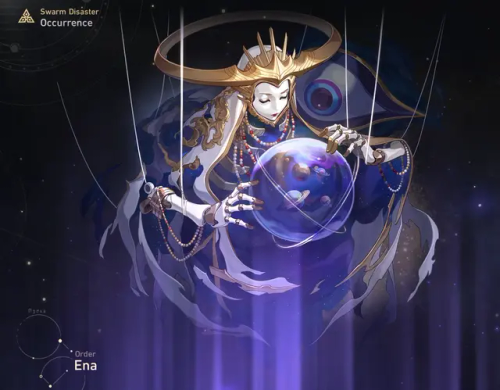
But... this is not how humanity has always defined "Order."
It was not always taken for granted that people had the power of self-determination, and in fact, for many centuries and across many cultures, the concept of "the order of the world" was tied directly to the concept of destiny. Whether a volcano would explode and destroy your entire civilization, whether floods would swallow your city, whether the crops would grow or fail all depended on the pre-made decisions of supernatural powers, who were in turn often personified concepts of the natural world itself. What happened to any given individual, what twists and turns their life would take, whether they would achieve their dreams or not--all these aspects were also predetermined, decided not by the actions of the individual but by fate itself.
Thus, the world and everything in it has a natural order. Things may seem chaotic, they may even seem unbelievably horrible, but all events in existence unfold as they should. We may not understand why, but everything occurs in due course, woven into an endlessly repeating pattern on the fates' loom--spring becomes summer, life becomes death, disasters happen and are healed from, children are born and grow old. If it is your fate to die, you will. If it is your fate to fight and live, you will. To reject this natural order would be as futile as telling the sun not to rise.
The words "order" and "ordained" have the same origin.
Enter Gaiathra. First of all, she is the Star Rail equivalent of a pagan goddess--her worship exists separate of the confirmed existence of aeons, by an uncontacted and non-space-faring race. Even her description, being triple-eyed, evokes other "triple goddess" figures across history, both in modern interpretations (the triple goddess of Neopaganism) and in ancient mythologies (the three fates of Greece, the Tridevi of Hindu culture, etc.).

She is strongly associated with the natural world: The planet of Sigonia is said to be a manifestation of her very body, the rain is her blessing and acknowledgment, and she goes through a yearly cycle of death and rebirth (calling the cycle of the seasons to mind). She is said to be a goddess of both fertility and travel (likely in the sense of nomadic wandering by the time Aventurine was born). Avgin worship of the goddess manifests in the form of sacrificial cyclic knots.

Which might call to mind another pagan culture well-known for their cyclic knots: the Celts, whose famous Celtic knots represent cycles of eternity, unity, and the interconnected nature of life itself.
The Avgin prayer to Gaiathra focuses on elements of a person's life that all might be determined by "fate"--will your blood keep flowing, will your journey be peaceful, will your schemes stay hidden? It hopes that things will be as they should, that the future ahead of you is predetermined to be a good one, and that the cycle of life decided by the goddess will be in one's favor.
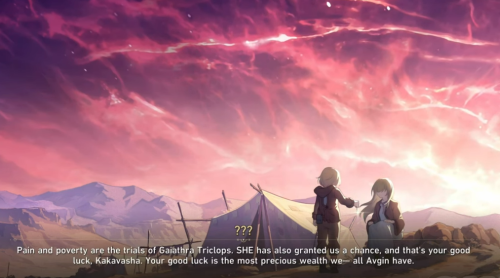
But while the Avgin hope for good things, they also strongly espouse embracing the reality of one's life, with suffering and hardships seen as manifestations of fate that should be accepted as facts of life. It is said that any society blessed by the Order ultimately falls--is it not the natural fate of all societies to one day fall? For mankind to return to the dust and be reborn anew?
Whatever will be, will be.
There is a reason--a logic--an order--to everything that happens.
I hope you can see where I'm going with this: While Sunday and Ena represent the concept of "Order" as a result of self-determination, a power "the strong" can wield to overcome the inherent chaos of reality, Aventurine and Gaiathra represent a different, older concept of "Order" (I can't help but see the entirely separate eye lurking behind Ena?): existence is not inherently chaotic but instead is foreordained, following endless orderly cycles life and death, weal and woe, rise and fall.
PHEW! Okay, so all of that to say Aventurine and Sunday make perfect parallels through a mirror darkly, even when it comes to the blessings they've been granted: One imposes order from on high; one continually rolls the dice despite knowing the inevitable outcome.
Both of their stories are entirely intertwined with the concept of fate, whether by opposing it...

Or accepting it.

And even at the end of Penacony, we leave both Sunday and Aventurine in precarious positions. Aventurine, while ostensibly "victorious," faces another roll of the dice immediately after Penacony, when his future as a Stoneheart is called into question. Yet "fate" comes through for him again--his bet, as always, comes true. His future isn't in question--it is the question itself. What's next? He finally wants to live to find out.
Sunday, meanwhile, ends Penacony's arc in a truly difficult place. He's virtually exiled from the only home he's ever known, a flightless bird tossed out of his cage into cold hard reality. He has to find an entirely new way forward and may even be forced to reckon with an entirely new definition of "Order" itself.
The parallels between these two characters are entirely intentional and very, very blatant, and I am exceedingly interested in seeing whether their paths diverge or continue to reflect similar fates moving forward.
So uhhh... that's what I think of Sunday? 😂
I guess it's because his Warp is called 'gilded imprisonment', and the phonecall with Jade where he says 'I don't wanna bet anything just to escape your clutches'.
Kinda makes him a foil to Robin and warped parallel to Sunday in a way I think if you see him as thinking of his job as a gilded cage. It may not really be true, maybe he can walk away anytime he wants I'm sure he has the power and ability to even if hed be up for silencing if he left the Stonehearts, but he has nowhere else to go so he may just be trapping himself there with his own apathy. Hope that made sense lol
Always enjoy reading your thoughts ty for the food 🙏
(Will answer the part about the character foils in a different post because that is a whole long thing of its own!!)
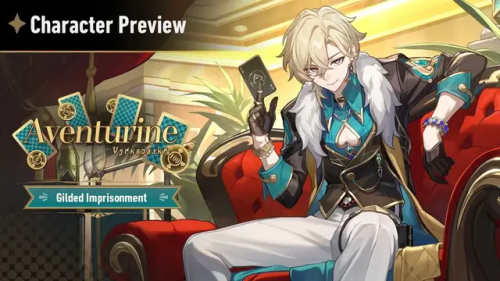
See, I definitely think this is the issue, because I have had people say that exact thing to me "Well his warp is called gilded imprisonment so that has to be referring to the IPC!" Like... Do people think the IPC has a monopoly on the word "gilded" or something? Or that "gilded" can only refer to literal gold coins and not any of the many, many metaphors for being a prisoner to destiny that are swirling around Aventurine?
"To gild" means to "cover thinly with gold." It doesn't mean to create wealth, to imply actual money, or even to relate at all to the concept of "golden handcuffs" (which is what people seem to be mistaking it for). Gilding could more accurately be described as a process of taking something cheap--like low-quality nickel--and plating it over with the thinnest layer of gold, to try to make the item seem much better than it is. Gilding something is often like dressing up a pig--you can make it look pretty on the outside, but on the inside, it's still a pig.

Just the thinnest layer of gold over a darker interior...
There's nothing about "gilded imprisonment" that automatically has anything to do with the IPC, unless you're already coming in with the impression that Aventurine is a prisoner of the IPC. If you start with a preconceived notion of what "imprisonment" means for Aventurine, then and only then do we make the jump to "Oh, this must be in reference to the IPC." Take that preconception out and there's zero connection lol.
Even the Chinese name of the warp, "囚石铸金" (lit. "Prison stones cast [in] gold") and other languages' translation of the banner name (like German's "Stein zu Gold," lit. "Stone to gold") imply that the most important element of the banner is "coating over something bad with something good"--i.e., turning prison walls into gold, turning the "stone" of his dark past into something shining. (This actually makes a nice irony in several languages, because he turned the rocky desert of his homeland and the stone walls of a prison into gold by... earning a Cornerstone and becoming a "Stoneheart"--or, that is, he himself is a "worthless" stone that has been thinly coated over in shiny wealth.)
But personally, if we really want to go by the English name of the banner, I would argue that it is much more likely Aventurine's banner name is a reference to his own troubled relationship with the concept of "blessings" and "destiny" than anything to do with the IPC.

From the beginning of his life, Kakavasha was told he was "blessed" and that he was the "chosen one." He was favored by a goddess, born on the day of her rebirth, and told that he will be the savior of his people. So, we can literally say he's the Avgin "golden child," which is further supported by the constant connection between Aventurine and gold colors (his golden-haired appearance, his mother's gold accessories with him since his birth, the word "Avgin" itself even meaning [golden] honey). So as the "golden child," we have this perception that his power of incredible luck, gifted to him by a goddess, must be a blessing, a good thing.
And yet that's not how it plays out for him. What his family tells him is a blessing ends up functioning more like a curse for Aventurine, when it becomes clear he can't use that luck of his to protect those who mean the most to him. He might be the goddess's golden child, the chosen one--but no one else is chosen with him. He's a failed savior, an incapable hero, and there is no escape from the destiny which has been decided for him.
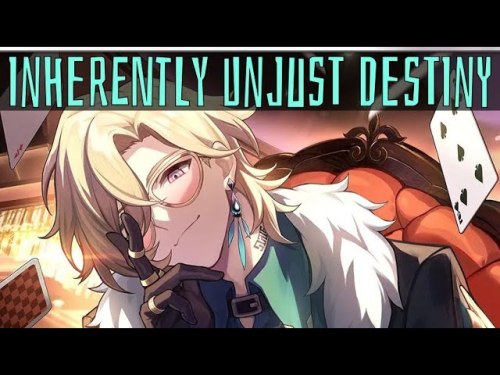
There's a reason his lightcone is called "Inherently Unjust Destiny." His own destiny, decided when he was born favored of an aeon, makes him a prisoner of the suffering that he can survive but never avoid.
We see how much this haunts him constantly throughout his experiences in 2.1...

To me, I would interpret the English banner name "Gilded Imprisonment" as much more related to how Aventurine's blessing, which is supposed to make him the favored, lucky, golden child, is actually nothing more than a thin veneer over the terrible destiny that binds him, continually costing him everything and everyone he loves.
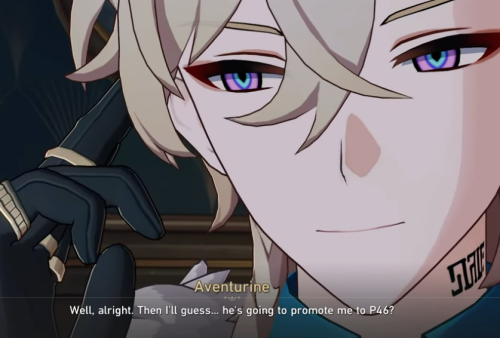
On to the other point entirely, I think people might also really be misinterpreting that sentence about "escaping Jade's clutches." Again, I think this relates a lot to the fact that people are coming into Aventurine's character with this preconception of him as a prisoner to the IPC, so they're interpreting this sentence in the most literal way possible ("I want to get away from you"), but that is actually not what Aventurine is saying at all there.
Jade's rank in the IPC is P46. If Aventurine is promoted to P46, he would no longer be her subordinate. Therefore, when he says "I don't want to bet anything just to escape your clutches," this is actually a (vaguely snarky, to be sure) compliment. Aventurine is saying "I don't want you to think I'm engaging in a bet [that I know I'll win] because I dislike working for you."

It's supposed to be flattery. He's saying "Don't think I'm trying to get away from you, oh great Madam Jade. I wouldn't try to make any bets just to get out of being your underling."
I think it's got a healthy dose of sarcasm to be sure, because Jade herself would have trained Aventurine to snatch every chance to get ahead. So now he's in the hilarious situation of having to balance the expected respect to his mentor ("Of course I would never want to leave you! You're the best boss!") with the fact that his own mentor wants him to be cut-throat at all costs lolol.
It's irony-laced flattery for sure.

That's why his next line is "Well, if it's just a friendly bet though, then sure, I'll engage." He's saying "So long as you know I'm not betting because I dislike working for you, sure, I'll play along." Because he knows that's what he's supposed to do--as a Stoneheart, he should be seizing every opportunity to advance. He virtually has to make this bet that he'll be promoted just to demonstrate the desirous personality that Jade would be expecting.
And honestly, it's supposed to be a callback to their first scene together too. They literally add that to text so people can't miss it. Kakavasha came to Jade as a person "hungry" to rise up the chain, to change his circumstances. He's making the same bet again to suggest to her that he hasn't changed in the slightest even after his experiences in Penacony.
(Now, why he's trying to act like he hasn't changed in front of Jade is another story, and "Aventurine is out to destroy the IPC" conspiracy theorists can run wild with this one for sure.)
But yeah. That line... really does not mean what people think it means, apparently.
Anddddd I'll get to the character foils in another post; this was already long enough as-is! 😂
Gendered pronouns in Japanese vs English
In Revolutionary Girl Utena, the main character Utena is a girl (it says so in the title), but very conspicuously uses the masculine first person pronoun 僕 (boku) and dresses in (a variation of) the boys school uniform. Utena's gender, and gender in general, is a core theme of the work. And yet, I haven’t seen a single translation or analysis post where anyone considers using anything other than she/her for Utena when speaking of her in English. This made me wonder: how does one’s choice of pronouns in Japanese correspond to what one’s preferred pronouns would be in English?

There are 3 main differences between gendered pronouns in Japanese vs English
Japanese pronouns are used to refer to yourself (first-person), while English pronouns are used to refer to others (third-person)
The Japanese pronoun you use will differ based on context
Japanese pronouns signify more than just gender
Let’s look at each of these differences in turn and how these differences might lead to a seeming incongruity between one’s Japanese pronoun choice and one’s English pronoun choice (such as the 僕 (boku) vs she/her discrepancy with Utena).
Part 1: First-person vs third-person
While Japanese does technically have gendered third person pronouns (彼、彼女) they are used infrequently¹ and have much less cultural importance placed on them than English third person pronouns. Therefore, I would argue that the cultural equivalent of the gender-signifying third-person pronoun in English is the Japanese first-person pronoun. Much like English “pronouns in bio”, Japanese first-person pronoun choice is considered an expression of identity.
Japanese pronouns are used exclusively to refer to yourself, and therefore a speaker can change the pronoun they’re using for themself on a whim, sometimes mid-conversation, without it being much of an incident. Meanwhile in English, Marquis Bey argues that “Pronouns are like tiny vessels of verification that others are picking up what you are putting down” (2021). By having others use them and externally verify the internal truth of one’s gender, English pronouns, I believe, are seen as more truthful, less frivolous, than Japanese pronouns. They are seen as signifying an objective truth of the referent’s gender; if not objective then at least socially agreed-upon, while Japanese pronouns only signify how the subject feels at this particular moment — purely subjective.
Part 2: Context dependent pronoun use
Japanese speakers often don’t use just one pronoun. As you can see in the below chart, a young man using 俺 (ore) among friends might use 私 (watashi) or 自分 (jibun) when speaking to a teacher. This complicates the idea that these pronouns are gendered, because their gendering depends heavily on context. A man using 私 (watashi) to a teacher is gender-conforming, a man using 私 (watashi) while drinking with friends is gender-non-conforming. Again, this reinforces the relative instability of Japanese pronoun choice, and distances it from gender.

Part 3: Signifying more than gender
English pronouns signify little besides the gender of the antecedent. Because of this, pronouns in English have come to be a shorthand for expressing one’s own gender experience - they reflect an internal gendered truth. However, Japanese pronoun choice doesn’t reflect an “internal truth” of gender. It can signify multiple aspects of your self - gender, sexuality, personality.
For example, 僕 (boku) is used by gay men to communicate that they are bottoms, contrasted with the use of 俺 (ore) by tops. 僕 (boku) may also be used by softer, academic men and boys (in casual contexts - note that many men use 僕 (boku) in more formal contexts) as a personality signifier - maybe to communicate something as simplistic as “I’m not the kind of guy who’s into sports.” 俺 (ore) could be used by a butch lesbian who still strongly identifies as a woman, in order to signify sexuality and an assertive personality. 私 (watashi) may be used by people of all genders to convey professionalism. The list goes on.
I believe this is what’s happening with Utena - she is signifying her rebellion against traditional feminine gender roles with her use of 僕 (boku), but as part of this rebellion, she necessarily must still be a girl. Rather than saying “girls don’t use boku, so I’m not a girl”, her pronoun choice is saying “your conception of femininity is bullshit, girls can use boku too”.

Through translation, gendered assumptions need to be made, sometimes about real people. Remember that he/they, she/her, they/them are purely English linguistic constructs, and don’t correspond directly to one’s gender, just as they don’t correspond directly to the Japanese pronouns one might use. Imagine a scenario where you are translating a news story about a Japanese genderqueer person. The most ethical way to determine what pronouns they would prefer would be to get in contact with them and ask them, right? But what if they don’t speak English? Are you going to have to teach them English, and the nuances of English pronoun choice, before you can translate the piece? That would be ridiculous! It’s simply not a viable option². So you must make a gendered assumption based on all the factors - their Japanese pronoun use (context dependent!), their clothing, the way they present their body, their speech patterns, etc.
If translation is about rewriting the text as if it were originally in the target language, you must also rewrite the gender of those people and characters in the translation. The question you must ask yourself is: How does their gender presentation, which has been tailored to a Japanese-language understanding of gender, correspond to an equivalent English-language understanding of gender? This is an incredibly fraught decision, but nonetheless a necessary one. It’s an unsatisfying dilemma, and one that poignantly exposes the fickle, unstable, culture-dependent nature of gender.

Notes and References
¹ Usually in Japanese, speakers use the person’s name directly to address someone in second or third person
² And has colonialist undertones as a solution if you ask me - “You need to pick English pronouns! You ought to understand your gender through our language!”
Bey, Marquis— 2021 Re: [No Subject]—On Nonbinary Gender
Rose divider taken from this post
I think Ratio would be good with kids. Children are always so curious about the world around them and asking questions about whatever they can see.
But they aren't cursed with the same ignorance as those who are older, those who choose not to learn, they're just experiencing everything that there is for the first time. I think he's patient and gentle with kids, ensuring he explains things in ways that are easier to grasp and understand fully depending on how old they are.
I think he would try to smooth down his sharp tongue when dealing with kids. He of course doesn't sugarcoat or lie about things but changing up his word choice when explaining more difficult topics so that the child won't be further confused or upset.
I think he would go out of his way to ensure that children don't feel stupid for asking questions. He doesn't patronize them for not grasping why the sky is blue, or where the sun goes at night. He simply explains it to them as he would anyone else.

I feel like this has been said before but I am obsessed with the potential for a Silver Wolf and Aventurine friendship
You know Aventurine has always been around old or rich people. He absolutely does not know slang. He also really doesn't know much about technology aside from what he needs for his job and what he learned along the way.
Now imagine a hacker whose only real goal is just to beat games. She finds out there's this guy who has a magical amount of luck and she tracks him down and has him pull for her gacha games.
Silver Wolf realizes Aventurine's potential for meta in her gacha games and takes him under her wing when it comes to the internet. Aventurine can't be a decade older than her but he acts like a boomer on the internet. She has to fix this
Aventurine communicates in bad Facebook memes and full sentences and gets back replies that should belong in Homestuck
The comedic potential is immense
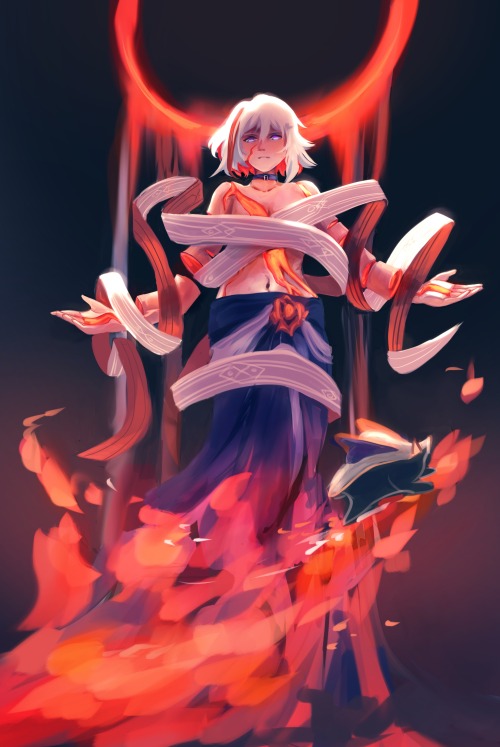


Aeons
gotta get the plot rolling
link to rest of the series -> here


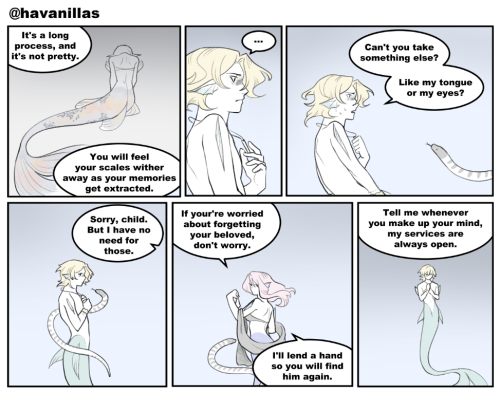

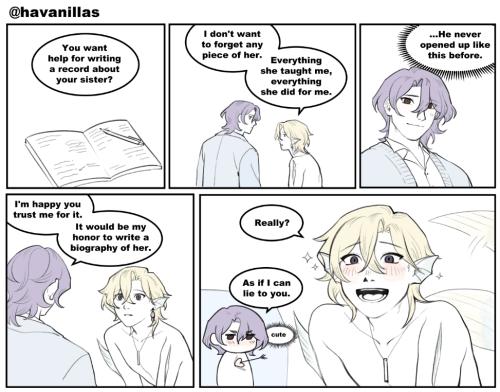
I wish everyone collectively understood aventurine’s character like you…things would be so much easier! I genuinely don’t understand how people keep getting his motivations wrong??? Could it be because some of the most popular Aven fanfics were written prior to his release? That could have contributed to some of the takes we tend to see about him…thoughts?
I struggled all day to come up with a concise way to answer this and couldn't think of one, so here, have a long-winded ramble:
I don't think early fic writers have much impact in the situation with Aventurine's character now, since most people can look at when a story was posted and go "Oh, this was before we had ____ information."
I think that Aventurine's problem is being a male character in a gacha game. Gacha game characters are designed to sell. Hoyo can sell female characters very, very easily. Give her huge tits and a visible underwear strap and you're good to go. I love all my guy friends, but I'm not gonna sugarcoat it: straight men are not the hardest audience to please. Hit a particular fetish (feet, spandex, dommy mommy), and you're gucci.
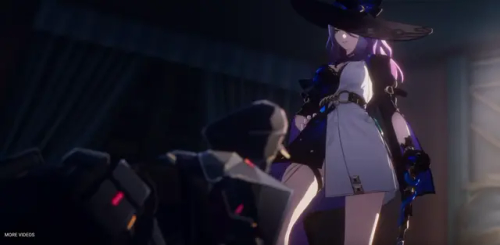
Nah, we all know why Jade's trailer is Like That.™
Male characters in gacha are harder to sell because women as consumers are a little harder to predict. Does every woman want a tall, ripped hunk? Shit, no, small cute boyish models like Aventurine are selling better now? Why?! Would a bad boy be more popular than a nice guy??? It's harder to account for women's tastes, especially because they are often (a little) less visually-oriented.
Hoyo is good at what they do though, and they've figured out that male characters sell very well when they possess at least one of two specific traits:
Endearing vulnerability/helplessness
Gay ship tease
Give a character both, like Aventurine? They might as well be printing money.
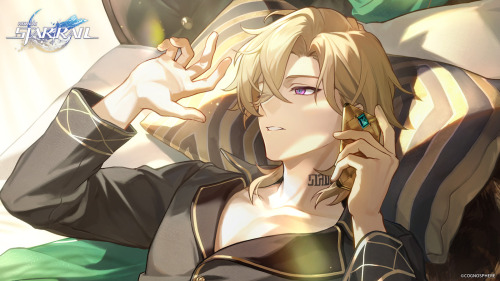
That sound you hear is Hoyo's stock prices rising.
So, from the very beginning, Hoyo is incentivized to create a character that appeals to people, a character people will want to crack their wallets open for. And they achieved this, first and foremost, by giving Aventurine traits that female players (in particular, but men too), find especially appealing: emotional and physical vulnerability.
We see Aventurine's pain. We sympathize with his grief. We identify with his struggle to make meaning of his difficult life. He's our woobie, blorbo, babygirl, whatever the hell they're calling it now.
He can't hide his suffering anymore. He's on the very edge. He's a dude in distress. He's surrounded by enemies! He misses his mama! He's been betrayed! No one understands him like you do, dear player!
The ultimate feeling evoked is: He needs to be saved.
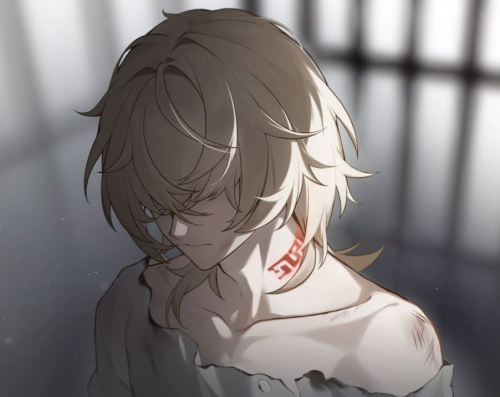
When people talk about male power fantasies, I think they forget that women can experience them too, and "Emotionally vulnerable man that only I (or my favorite character) can fix" is actually a female power fantasy.
And from there it's really easy, right: the people who shell out cash to buy warps for their harmed-husbando feel like they've saved him; the people who are into mlm ships look for the nearest hot dude to be the savior Ratio was waiting for his time lol.
Morally and intellectually, this type of deep-down-golden-hearted, emotionally-wounded male character is very easy to digest. There is nothing to dislike about this type of character or role in the story: this character is a good guy who has just gone through so many terrible situations, whose victim status makes him endearing, and whose lack of agency means that any of the questionable or downright bad things he does are always the result of someone else forcing his hand, and never something he would have chosen himself.
His motivations are always clear and consistent: get free, heal, and live happily ever after.

Insert the Wreck-It Ralph meme: "Do people assume all your problems got solved when a big strong man showed up?" But to be fair, a big strong man did kind of solve Aventurine's problem, so--
Anyway, it's simple. It's straightforward. Morally, it's pretty cut and dry, black and white: Aventurine is our hero, which means everyone dictating the course of his miserable life is evil.
Hoyo is not remotely discouraging people from literally buying into this emotional appeal.
And trust me, I get it. I'll be the first to admit that hurt-comfort is its own entire genre in fandom because it is so appealing. People eat up Aventurine's tragic backstory like candy! The idea of watching a character go through hell at the hands of bad guys just to finally find a happy end is like the definition of everyone's favorite story.
In fact... people love Aventurine's suffering so much, they have invented whole new ways for him to suffer that aren't even in the game.
This is where we get all the headcanons that Aventurine was a sex slave, every single person he meets hates him because of his race, the Stonehearts are executioners holding knives to his throat, Jade enslaved him to the IPC with a lifelong contract, his material possessions belong to the company, the IPC is forcing him to take only the most dangerous missions where he is being required by his evil jailers to continually put his life on the line... You name it and I promise you, I can find a fanfic where Aventurine suffers from it. 😂

Bro can't even sleep in on his day off; life is so hard for this man.
Being serious: if the game is telling us that Aventurine is a victim... Why not make him the perfect victim?
Why not envision an Aventurine with no freedom, who bears no responsibility for any of the horrible situations he is in or any of the dubious things he does?
It's so natural to like that version of Aventurine, so appealing to see a totally powerless underdog use his own wits and charms to claw his way up to freedom. Or, if you're the kind who really relishes angst: It's even appealing to see Aventurine lose more. To delight in fics where he loses his wealth, where the IPC punishes him for past crimes while he's powerless to stop them... (I assure you, this is many people's cup of tea and the fanfics prove it!)
Ultimately, there's nothing wrong with liking characters who are exactly this straightforward! It's completely fine to embrace characters that are intentionally written to be morally above-board, whose primary role in the story is to generate angst by being a good person who suffers, or those characters who never show unlikable traits, bad decisions, or contradictory actions.
The problem is that that's just not who the game is telling us Aventurine is.
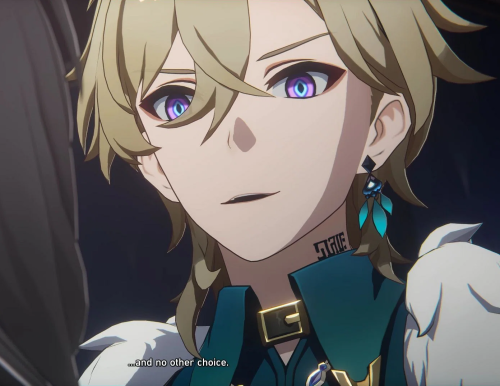
Hoyo may be capitalizing off people who love to envision poor Aventurine still living his life as a slave... But the game also needs to tell a complicated enough story overall to appeal to people who don't care about this specific husbando--Aventurine's role in the actual game's plot has to be interesting enough for almost everyone to appreciate it, not just Aventurine's simp squad. (Don't get mad, I'm in the simp squad with you.)
So his character doesn't stop at just being a pure-hearted victim who is still waiting to be saved.
Aventurine is not that easy to label, and I think the biggest struggle in this character's fandom right now is between people who prefer the even-more-angsty, still-a-slave Aventurine versus people who want a morally grey, self-destructive character instead.
To me personally, while I greatly understand the appeal of fanon!Aventurine and the joy of a really juicy angst fic where characters lose it all, I think that missing out on the depth that canon is suggesting would be a real loss on the fandom's part.
The character motivations that Aventurine shows in the game are complicated. They cancel each other out. They're basically self-harm! He makes almost every situation he's in worse for himself--on purpose.
He is a good person, but also a person who has done unspeakable things. He does have morals, but he's not above allowing those who don't have them to use him to their advantage.
He's both the victim and the victor. He's his own worst enemy. He's a lost little boy who's been making terrible decisions for himself since he was like eight years old, and a grown ass man who is barely managing to fake his way through an existence that destiny is not letting him quit.

This kind of character is a lot harder to embrace. He's done things that most people would find appalling--like willingly joining up with the organization that let his entire race be massacred. He's invented a whole new peacock persona to frivolously flaunt riches he doesn't even care about (Poison Dart Frog Self-Defense 101). He actively plays into racist stereotypes about his people to manipulate others through their preconceived expectations. He's made a mockery of his mother's and sister's hopes and dreams by endlessly trying to throw his own life away.
He has flaws! He bet everything he had on a ploy without doing his homework to find out if the people he was risking his life for were even still around. (Maybe he already knew, and couldn't bear to admit it, even to himself.) He's intentionally off-putting and obnoxious to everyone he meets (Poison Dart Frog Self-Defense 102). He terrifies everyone who gets close to him by (seemingly) carelessly throwing himself into the jaws of death without the slightest provocation.
He knowingly allows the IPC to exploit his power and talents for profit. Did everyone forget that his role in the Strategic Investment Department is asset liquidation?! Like, his actual day-to-day job is ruining people's lives. Canonically, Aventurine kills people when his deals go bad.

His motivations change off-screen in two lines of story text. We're told in one line that his biggest reason for joining the IPC was to make money to save the Avgin, then in the next line we find out that's impossible. And... then what? What motivations does he even have now? The whole point of his character arc from 2.0-2.1 is that he was on the edge of giving in to utter despair and nihilism because he couldn't even perceive a single reason to stay alive. He has no purpose in life before Penacony, and that didn't start with the Stonehearts at all??
People keep saying Aventurine was held in the IPC by golden handcuffs, but how do you tie down someone for whom profit is meaningless? What can you offer to a man whose only desire is to bring back something already lost forever? How do you imprison someone whose only definition of freedom is, canonically, death?

Working for the Stonehearts is obviously not healthy. But that's why Aventurine was doing it--because taking dangerous missions allowed him to put himself at risk. The job that he originally pursued hoping to save his people became a direct means to self-harm, and the IPC's only real role in that was just happily profiting off the results.
The journal entries for Aventurine's quests are there deliberately to tell the player what is on his mind, and none of it has to do with escaping from his job:

Like... Work is the least of this man's problems.
At really the risk of rambling on too long now, he's also just a massive walking contradiction:
Aventurine is among the most explicitly religious characters in the game, yet he's one of the only people in the entire game that we have ever seen actively question his people's aeon.
You might be tempted to think Aventurine's risky gambles with his life as an adult are a result of giving up after finding out about the Avgin massacre... Butttt no, Hoyo makes sure to tell us that even at knee-high in the Sigonian desert, Kakavasha was already willing to risk himself in a fight to the death against monsters because even back then he found his own life to have less value than a single memento.
He's the "chosen one" who will lead his people to prosperity... except they're all dead.
He's explicitly suicidal... andddd also a pathstrider of Preservation.
He wants to die... He doesn't want to die. He wants to make it end, yet goes to staggering lengths to continually survive. (Every plan risks his life on purpose--but every plan's win condition is also to live.) He life is the chip tossed down, but his hand is trembling beneath the table. When faced with an otherwise unsurvivable situation, Aventurine literally became a winner of the Hunger Games. He beat other innocent people to death with his own chain-bound hands just to come out alive.

He knows the IPC failed the Avgin and left them to die... and he still willingly sought out a position of power in their organization. Maybe he really is after revenge... but maybe not.
He starts his journey in the IPC with a truly noble goal in mind: to help his people using his newfound wealth and power. He's a good guy who did genuinely want to save the Avgin and repay all those who helped him. But once it became clear he was too late, once it was obvious he would have no use at all for that monetary wealth and power he risked his life to get... What did he do with it? Unlike Jade, we don't see him over here donating to orphanages. (I'm not that heartless; I'm sure he does actually do a lot of good things with his money on the side, but the point is that the game does not show us that--it shows us, over and over again, Aventurine putting on a wasteful, over-indulgent persona toward wealth. We've supposed to feel how meaningless money is to him, how meaningless everything is becoming to him.)
He outright refuses to use underhanded tactics or to cheat at gambles, which is meant to show us that's he's more morally upright than his coworkers. There's an entire exchange where he says that he'll never stoop to using manipulation the way Opal does. But... he doesn't have any issue fulfilling Opal's exact agenda. He was never remotely morally conflicted about denying the Penaconians their freedom by dragging Penacony back under IPC control.

He's willing to risk his own life, which is one thing--but he's also willing to risk other people's well-being. Topaz accuses him of constantly egging their clients on into dangerous situations; we've actively seen him shove a gun into Ratio's hands and pull the trigger with no care for how Ratio would feel about that on their very first meeting... Dragging the Astral Express crew into the entire Penacony plan in the first place was exceedingly dangerous...
To me, I just think it's vital to understand his character through the lens of these contradictions because they demonstrate the extreme polarity of Aventurine's life: from rags to riches, from powerless to empowered by multiple aeons, from willing to kill to survive to killing himself... He has quite literally lived a life of "all or nothing," and while he is the victim of many terrible situations out of his control, his arc as a character involves facing the truth of himself and the future his own actions are hurtling him toward.

Frankly, the Aventurine that canon is suggesting is a little annoying. You want to grab him by the shoulders, shake him, and say "Why are you like this?!" And he won't even have an answer for you, because he doesn't even know why he's still alive.
In the end, to me, this is so, so much more interesting. I can read an endless supply of hurt-comfort fics where Aventurine escapes the evil IPC and Ratio is there to fill the void in his life with the power of love and catcakes and be a perfectly happy clam online, but I want canon to continue to serve us this incredible mess of a man who constantly takes one step forward and two steps back.
Who is fully aware of his role as a cog in the grotesque profit-wheel of cosmic capitalism and still manages to say he never changed from the rags-wearing desert rat of the Sigonian wastes.
Who over and over again flirts with nihility but, ultimately, even if he has to wrest it from the grip of the gods themselves with bloody, chain-bound hands, chooses life.
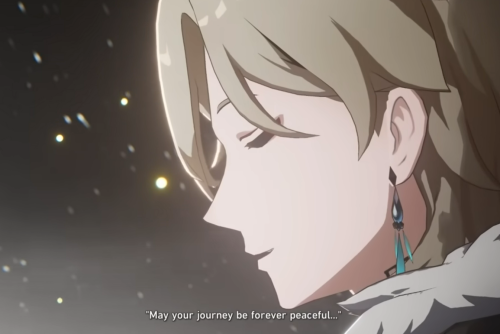
"maybe in another life-" no. there isn't one. this is it. this is your life and it's ending one minute at a time.